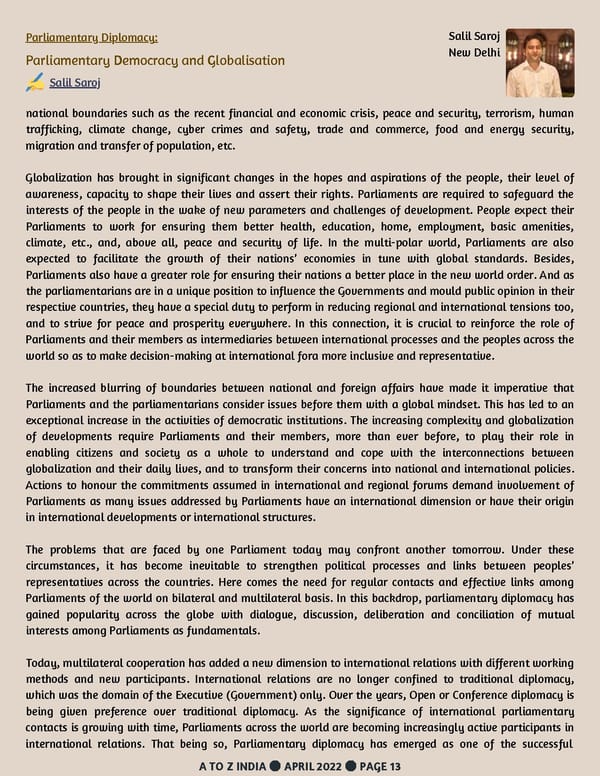national boundaries such as the recent financial and economic crisis, peace and security, terrorism, human trafficking, climate change, cyber crimes and safety, trade and commerce, food and energy security, migration and transfer of population, etc. Globalization has brought in significant changes in the hopes and aspirations of the people, their level of awareness, capacity to shape their lives and a ssert their rights. Parliaments are required to safeguard the interests of the people in the wake of new parameters and challenges of development. People expect their Parliaments to work for ensuring them better health, education, home, employment, basic amenities, climate, etc., and, above all, peace and security of life. In the multi-polar world, Parliaments are also expected to facilitate the growt h of their nations’ economies in tune with global standards. Besides, Parliaments also have a greater role for ensuring their nations a better place in the new world order. And as the parliamentarians are in a unique position to influence the Governments and mould public opinion in their respective countries, they have a special duty to perform in reducing regional and international tensions too, and to strive for peace and prosperity everywhere. In this connection, it is crucial to reinforce the role of Parliaments and their members as intermediaries between international processes and the peoples across the world so as to make decision-making at international fora more inclusive and representative. The increased blurring of boundaries between national and foreign affairs have made it imperative that Parliaments and the parliamentarians consider issues before them with a global mindset. This has led to an exceptional increase in the activities of democratic institutions. The increasing complexity and globalization of developments require Parliaments and their members, more than ever before, to play their role in enabling citizens and society as a whole to understand and cope with the interconn ections between globalization and their daily lives, and to transform their concerns into national and international policies. Actions to honour the commitments assumed in international and regional forums demand involvement of Parliaments as many issues addressed by Parliaments have an international dimension or have their origin in international developments or international structures. The problems that are faced by one Parliament today may confront another tomorrow. Under these circumstances, it has become inevitable to strengthen political processes and links between peoples’ representatives across the countries. Here comes the need for regular contacts and effective links among Parliaments of the world on bilateral and multilateral basis. In this backdrop, parliamentary diplomacy has gained p opularity across the globe with dialogue, discussion, deliberation and conciliation of mutual interests among Parliaments as fundamentals. Today, multilateral cooperation has added a new dimension to international relations with different working methods and new participants. International relations are no longer confined to traditional diplomacy, which was the domain of the Executive (Government) onl y. Over the years, Open or Conference diplomacy is being given preference over traditional diplomacy. As the significance of international parliamentary contacts is growing with time, Parliaments across the world are becoming increasingly active participants in international relations. That being so, Parliamentary diplomacy has emerged as one of the successful A TO Z INDIA ● APRIL 2022 ● PAGE 13 Salil Saroj Parliamentary Democracy and Globalisation Parliamentary Diplomacy : Salil Saroj New Delhi
 A TO Z INDIA - APRIL 2022 Page 12 Page 14
A TO Z INDIA - APRIL 2022 Page 12 Page 14